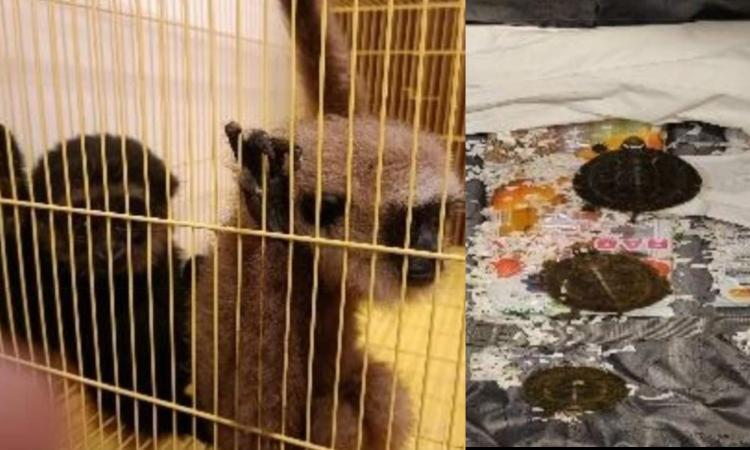
Man Caught with Monkeys, Tortoises at Chennai Airport
Wildlife smuggling has been on the rise globally, and India is no exception. In a recent incident, a man arriving from Bangkok was arrested at Chennai airport on Wednesday night for smuggling two live monkeys of different species and seven tortoises. The animals were concealed in ventilated carry bags and cloth sacks, highlighting the ingenuity and desperation of wildlife traffickers.
According to reports, the passenger, whose identity has not been disclosed, was stopped by customs officials at the Chennai airport’s international terminal around 10 pm on Wednesday. During a routine check, the officials discovered the unusual cargo, which was cleverly hidden to avoid detection.
The monkeys, a macaque and a langur, were found in ventilated carry bags, while the tortoises were stuffed into cloth sacks. The animals were in good condition and appeared to be healthy, suggesting that they had been carefully handled to ensure their survival during the journey.
The customs officials immediately apprehended the passenger and handed him over to the airport police. He was later remanded to judicial custody, pending further investigation.
In a swift and commendable move, the seized animals were immediately repatriated to Thailand, their country of origin. The Thai authorities were alerted, and a team was dispatched to collect the animals and take them back to their natural habitat.
This incident is a stark reminder of the growing threat of wildlife smuggling in India. The country is a major transshipment point for illegal wildlife products, including animals, plants, and even body parts. The demand for exotic wildlife is driven by a thriving illegal trade, fueled by high prices and a lack of awareness about the devastating consequences of wildlife trafficking.
Wildlife smuggling not only harms the animals themselves but also undermines conservation efforts and threatens the very survival of many species. It also poses a significant risk to human health, as many animals traded illegally are carriers of diseases that can be transmitted to humans.
The Chennai airport incident is also a wake-up call for the authorities to step up their vigilance and cooperation in combating wildlife smuggling. The Customs Department, in particular, has a crucial role to play in detecting and preventing the illegal trade of wildlife products.
In recent years, there have been several instances of wildlife smuggling at Indian airports, including the seizure of pangolins, rhino horns, and even elephant tusks. While these efforts are commendable, more needs to be done to address the root causes of wildlife trafficking and to strengthen the legal framework to combat it.
The public also has a critical role to play in preventing wildlife smuggling. By reporting suspicious activities and being aware of the illegal trade in wildlife products, individuals can help to disrupt the supply chain and bring traffickers to justice.
In conclusion, the recent incident at Chennai airport serves as a stark reminder of the seriousness of wildlife smuggling and the need for concerted efforts to combat it. The authorities, civil society, and the public must work together to protect endangered species and prevent the illegal trade in wildlife products.






